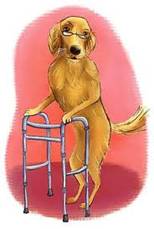THE GOLDEN OLDIE YEARS
By Dr Kelly Sperling
.

Like people, dogs are individual in the way they age. Certain breeds, mixed breeds, and, in general, smaller dogs tend to live longer than larger breed dogs. Understanding their age and providing them with the right care, we can help our furry friends to enjoy their last few years in comfort.
Here are some ways in which we can help our older dogs
If you notice anything out of the ordinary consult your vet. Don’t make the mistake of brushing it off as just a symptom of old age. In many cases there is treatment for those symptoms, even to ease their pain and increase their quality of life.
Alternative methods to assist your senior dog can include nutrition, herbs, acupuncture, chiropractic, hydrotherapy, t-touch and massage.
Nutritional Supplements that can assist your senior dog
Check with your vet before introducing nutritional supplements into your dog's diet. An excess amount of something that is normally beneficial may create an imbalance in your dog's overall nutritional status.
Omega 3
Vitamin B12
Vitamin E
Vitamin C
Brewer's yeast
Bromelain
From a homeopathic point of view, as mentioned in my previous article: homeopathy is prescribed according to an individual’s unique presentation of the disease (or in this case ageing). Therefore it is best if you consult a homeopath regarding the specific ailments your dog is experiencing.
As with any illness, it is very important that your dog be checked by a vet. These recommendations are only suggestions and cannot replace treatment by a vet. However they can be used in conjunction with other treatments.
Here are some ways in which we can help our older dogs
- Take your dog to their vet for a check-up twice a year.
- Become informed about conditions and diseases common to senior dogs, be on the lookout for symptoms and, should they arise, inform your vet promptly.
- Ensure they have a comfortable clean bed.
- Consider feeding a 'senior' pet diet, nutritionally appropriate for the older dog.
- Consider giving two small meals a day rather than one large one.
- Don't overfeed - obesity causes many health problems and may shorten your dog's life.
- Provide fresh water daily (note changes in water consumption).
- Make sure your dog receives adequate exercise, according to physical capacity.
- Ease distractions - senior pets can be easily startled by or become fearful of: kids, loud noises, and general commotion as they age. Conditions such as arthritis can make the dog fearful of getting hurt (or the potential to get hurt) with sudden movements of kids or being stepped on.
- Look after your dog's dental health. Brush teeth daily and have them cleaned professionally when your vet so advises.
- Do your utmost to control ticks and fleas and make sure your dog and the environment are always clean.
- Give your dog lots of love and attention and do all you can to keep them interested, active, happy and comfortable.
- Sustained, significant increase in water consumption or urination
- Sudden weight loss or gain
- Significant decrease in appetite or failure to eat for more than two days
- Significant increase in appetite
- Repeated vomiting
- Diarrhoea lasting over three days
- Difficulty in passing stool or urine
- Change in housebreaking
- Lameness lasting more than five days or lameness in more than one leg
- Noticeable decrease in vision
- Cloudy appearance in the eyes
- Open sores or scabs on the skin that persist for more than one week
- Foul mouth odour or drooling that lasts more than two days
- Bleeding or swollen gums
- Increasing size of the abdomen
- Increasing inactivity or amount of time spent sleeping
- Hair loss, especially if accompanied by scratching or if in specific areas (as opposed to generalised)
- Excessive panting
- Inability to chew dry food
- Blood in stool or urine
- Sudden collapse or bout of weakness
- A seizure (convulsion)
- Persistent coughing or gagging
- Breathing heavily or rapidly at rest
- Difficulty getting up from a lying position
- Any bumps or tumours on the skin
If you notice anything out of the ordinary consult your vet. Don’t make the mistake of brushing it off as just a symptom of old age. In many cases there is treatment for those symptoms, even to ease their pain and increase their quality of life.
Alternative methods to assist your senior dog can include nutrition, herbs, acupuncture, chiropractic, hydrotherapy, t-touch and massage.
Nutritional Supplements that can assist your senior dog
Check with your vet before introducing nutritional supplements into your dog's diet. An excess amount of something that is normally beneficial may create an imbalance in your dog's overall nutritional status.
Omega 3
- Controls inflammation and maintains joint health
- Skin and coat health
- Allergies and autoimmune conditions
- Yeast infections
- To encourage the proper development of the retina and visual cortex
- Heart problems
- Certain type of cancers
- Hypertension
- helps rehabilitate damaged cartilage
- anti-inflammatory properties
Vitamin B12
- for energy and metabolism
- protects against neurological deterioration
Vitamin E
- an antioxidant
Vitamin C
- an antioxidant
- enhances immune function
- may reduce the risk of cataracts
- promotes healing of wounds
Brewer's yeast
- a good source of the B-complex vitamins
- energy booster
- enhances the immune system
- increase mental and physical efficiency
Bromelain
- aids digestion
- anti-inflammatory
From a homeopathic point of view, as mentioned in my previous article: homeopathy is prescribed according to an individual’s unique presentation of the disease (or in this case ageing). Therefore it is best if you consult a homeopath regarding the specific ailments your dog is experiencing.
As with any illness, it is very important that your dog be checked by a vet. These recommendations are only suggestions and cannot replace treatment by a vet. However they can be used in conjunction with other treatments.

